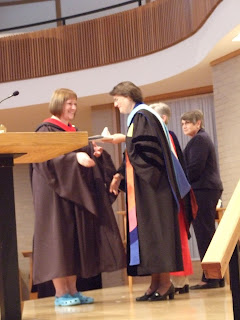If I am to be honest, my most immediate response, as someone who has devoted much of her ministry to the nurture of young people, is to become defensive. But a defensive posture is rarely a healthy posture. So, I must admit that I'm not entirely sure how to respond to such statements.
I agree, that I cannot possibly fathom what it feels like to hold your newborn child in your arms for the first time. To get up night after night (or hour after hour) for feedings and to clean up vomit. To help your child navigate school and friendships. To drive children from one place to another, all.day.long. To ache when you see your child make unwise choices and to celebrate with them in their accomplishments. To hold them when they are ill and to encourage them in the things that bring them deepest joy. I can't walk a mile in your shoes. It's simply not possible.
But does that mean that I can't journey with you?
Often it seems that the only way that society can understand "helping" parents is through criticism. It's by watching them, pointing out what they're doing wrong, and then giving them info (often from the internet) on how they can do things better. Certainly, this is not helpful. I've heard enough parents express frustration over random strangers coming up and criticizing them in grocery stores! And I'm sure I have been guilty of offering criticism, though perhaps not to strangers, and hopefully not often. No one appreciates such judgment.
However, I hope that there are other ways that people who don't have their own children can be of support to those who do. One of the guiding scripture passages in my life is Deuteronomy 6:4-9.
4 Hear, O Israel: The Lord is our God, the Lord alone. 5You shall love the Lord your God with all your heart, and with all your soul, and with all your might. 6Keep these words that I am commanding you today in your heart. 7Recite them to your children and talk about them when you are at home and when you are away, when you lie down and when you rise. 8Bind them as a sign on your hand, fix them as an emblem on your forehead, 9and write them on the doorposts of your house and on your gates.
This is the way that we pass faith along to the next generation, and it is a command for all of us, not only parents.I want parents to know that they are not alone. That the endeavor of raising their children is one that they can share with a supportive community. My goal is not to judge parents, but to listen, to watch, to learn to recognize the systems in which they and all of us live, and to offer whatever support might lead them towards life. My ministry to families involves paying attention, not problem solving. It involves listening for the soul, not judgment. And while I don't know what it's like to be a parent, I do know what it's like to be a child (at least in a retrospective sort of way). And certainly I know what it's like to run out of time. To not have the time to find resources, or to make supper, or to listen. This is what I hope to offer families. I hope that I can arrange my own life in such a way as to be able to offer them my time. To be available to do some of the searching for resources that families often can't do on their own, to bring food when getting dinner together is just an unmanageable burden, and to listen when it feels like the ears of the world are deafened to the longings of the soul.
No, I don't have children... but I hope I can still journey with those who do.







